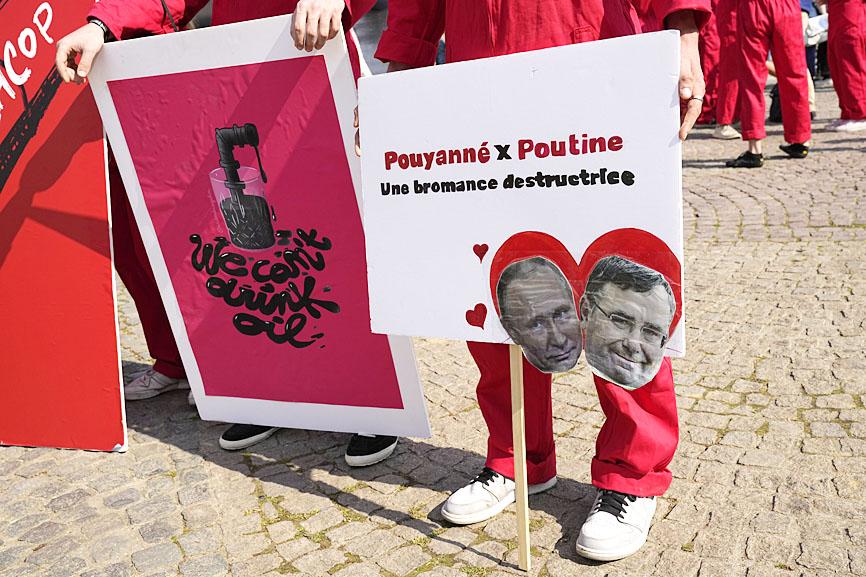TotalEnergies SE does not plan to divest its Russian assets amid the war in Ukraine, as doing so would essentially mean handing them over to Russian President Vladimir Putin, TotalEnergies chief executive officer Patrick Pouyanne said.
“For me it’s a question of accountability and the responsibility of the offshore stakeholders,” Pouyanne told a conference in Doha on Saturday. “Do I give them for free to Mister Putin? Because this is what it means leaving today and giving my shares.”
The French energy firm earlier last week said it would no longer sign or renew contracts to buy oil and petroleum products from Russia, with the aim to halt all purchases by the end of this year at the latest, and has begun “gradual suspension” of Russian operations, the company said in a statement.

Photo: AP
The war in Ukraine has sent shockwaves through energy markets, pushing oil and natural gas prices higher, and causing many buyers to shun Russian crude. Some of the world’s largest oil companies — including Shell PLC, BP PLC and Exxon Mobil Corp — have pledged to exit Russia, reducing capital available for investment.
TotalEnergies has said it would no longer provide capital for new projects there.
“They do what they want, and we do what we want,” Pouyanne said of his company’s international peers.
BP and Shell have also said they would not make any new purchases of Russian oil and gas, but would not immediately be able to disentangle themselves from the country due to long-term contracts and the difficulty to find alternative supplies.
TotalEnergies does not operate any oil or natural gas fields in Russia, nor any liquefied natural gas (LNG) plants. It is a minority shareholder in several non-state-owned Russian companies. It owns about one-fifth of gas producer Novatek PJSC, as well as a large interest in the Yamal LNG project, Russia’s biggest producer of the commodity.
Pouyanne said his company finances plants in Russia, but that “they are operated by a Russian company, which can do it without us. This plant will continue to produce, whether or not we stay.”
In its statement on Tuesday, TotalEnergies condemned Russia’s invasion and said it would ensure strict compliance with European sanctions, “no matter what the consequences on the management of its assets in Russia.”
French Minister of the Economy, Finance and Recovery Bruno Le Maire said earlier this month that TotalEnergies is not contravening any sanctions.
The US and UK have taken steps to ban imports of oil from Russia, but EU countries have been divided on the issue. Still, the bloc is racing to reduce its dependency on Russian energy sources. The country supplies about 40 percent of the natural gas consumed in the EU.
Qatari Minister of Energy Saad Sherida al-Kaabi said his gas-rich country would not “immediately” be able to help Europe with energy supplies to replace those from Russia.
“The volume we’re talking about — the 30 percent to 40 percent coming from Russia to Europe — is not something that can be replaced overnight,” he said.

SELL-OFF: Investors expect tariff-driven volatility as the local boarse reopens today, while analysts say government support and solid fundamentals would steady sentiment Local investors are bracing for a sharp market downturn today as the nation’s financial markets resume trading following a two-day closure for national holidays before the weekend, with sentiment rattled by US President Donald Trump’s sweeping tariff announcement. Trump’s unveiling of new “reciprocal tariffs” on Wednesday triggered a sell-off in global markets, with the FTSE Taiwan Index Futures — a benchmark for Taiwanese equities traded in Singapore — tumbling 9.2 percent over the past two sessions. Meanwhile, the American depositary receipts (ADRs) of Taiwan Semiconductor Manufacturing Co (TSMC, 台積電), the most heavily weighted stock on the TAIEX, plunged 13.8 percent in

A wave of stop-loss selling and panic selling hit Taiwan's stock market at its opening today, with the weighted index plunging 2,086 points — a drop of more than 9.7 percent — marking the largest intraday point and percentage loss on record. The index bottomed out at 19,212.02, while futures were locked limit-down, with more than 1,000 stocks hitting their daily drop limit. Three heavyweight stocks — Taiwan Semiconductor Manufacturing Co (TSMC, 台積電), Hon Hai Precision Industry Co (Foxconn, 鴻海精密) and MediaTek (聯發科) — hit their limit-down prices as soon as the market opened, falling to NT$848 (US$25.54), NT$138.5 and NT$1,295 respectively. TSMC's

TARIFFS: The global ‘panic atmosphere remains strong,’ and foreign investors have continued to sell their holdings since the start of the year, the Ministry of Finance said The government yesterday authorized the activation of its NT$500 billion (US$15.15 billion) National Stabilization Fund (NSF) to prop up the local stock market after two days of sharp falls in reaction to US President Donald Trump’s new import tariffs. The Ministry of Finance said in a statement after the market close that the steering committee of the fund had been given the go-ahead to intervene in the market to bolster Taiwanese shares in a time of crisis. The fund has been authorized to use its assets “to carry out market stabilization tasks as appropriate to maintain the stability of Taiwan’s

STEEP DECLINE: Yesterday’s drop was the third-steepest in its history, the steepest being Monday’s drop in the wake of the tariff announcement on Wednesday last week Taiwanese stocks continued their heavy sell-off yesterday, as concerns over US tariffs and unwinding of leveraged bets weighed on the market. The benchmark TAIEX plunged 1,068.19 points, or 5.79 percent, to 17,391.76, notching the biggest drop among Asian peers as it hit a 15-month low. The decline came even after the government on late Tuesday authorized the NT$500 billion (US$15.2 billion) National Stabilization Fund (國安基金) to step in to buoy the market amid investors’ worries over tariffs imposed by US President Donald Trump. Yesterday’s decline was the third-steepest in its history, trailing only the declines of 2,065.87 points on Monday and